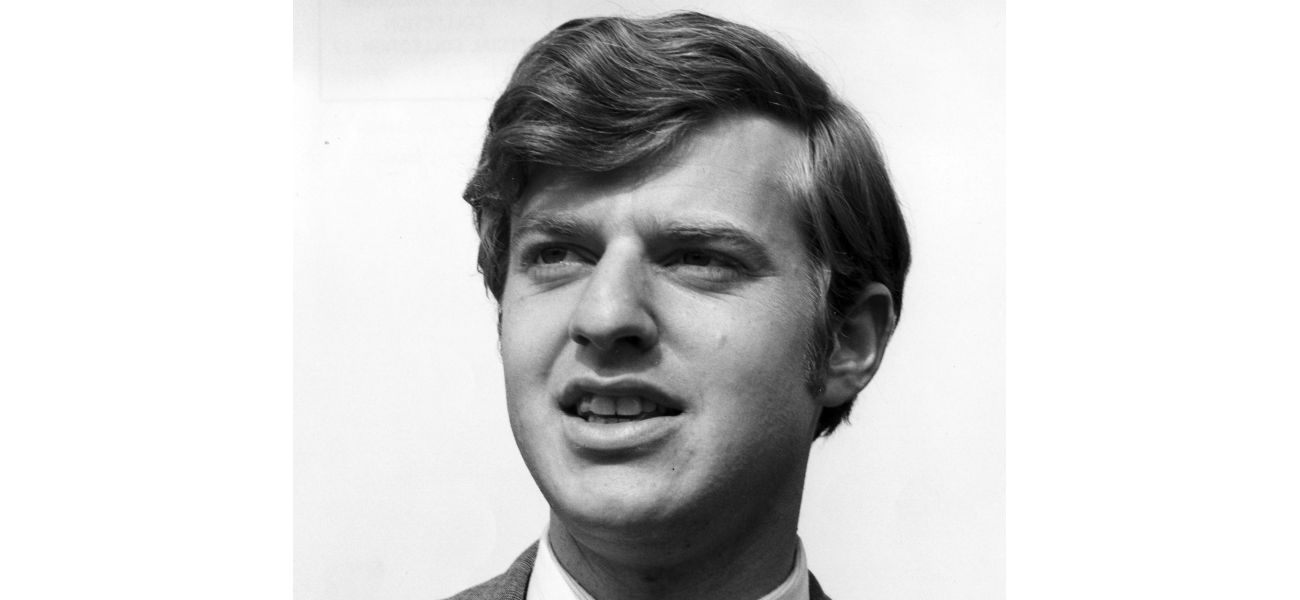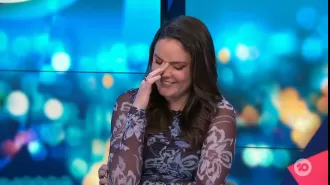Proud to work on Jerry Springer, but one guest's shocking behavior led to my resignation.
Jerry Springer's show, with its controversial titles such as 'I married a horse' and 'I cut off my manhood', challenged the idea of being a reality TV show.
January 7th 2025.

Up Next
On the infamous Jerry Springer show, TV producer Toby Yoshimura had a realization that his time was up when he knocked on a hotel door and found the father of a guest, who was a sex worker, answering in just a towel. This guest had been paid for sex by her father since she was 16 and wanted to confront him on the show. Despite being put in different hotels with aliases, the awkward encounter between the father and daughter was the final straw for Toby.
With titles like ‘I married a horse’ and ‘I cut off my manhood’, the Jerry Springer show was known for its extreme and outrageous guests and their shocking stories. It was difficult to see it as reality TV, but as Toby discovered over the years, truth is indeed stranger than fiction. This was the reason why people loved the show.
The show, which first aired in 1991, was a one-of-a-kind experience on television. Small-town Americans with unusual fetishes, addictions, and complicated personal lives were brought to the Chicago studio to air their dirty laundry in front of a live audience. As the drama played out on stage, audience members would chime in with their opinions and things often escalated into physical fights, with burly security guards keeping a close watch.
It was the beginning of American shock culture and the pioneer of the reality TV format that we know today. The Jerry Springer show received both adoration and condemnation for its wild and controversial content. Executive producer Richard Dominick, who was credited for the show's "wild and sexy" nature, had a simple rule for his producers: "Do not bring anything to me that is not interesting with the sound off." He wanted people to stop and watch the show, even if they were just flipping through channels in the early hours of the morning.
The show pushed boundaries and gained even more attention when it invited members of the Ku Klux Klan to argue with the audience over their hateful views in 1997. This sparked criticism and raised questions about whether the show had gone too far. Jerry Springer, a former mayor, newsreader, and child of Jewish refugees, defended the show's inclusion of controversial guests, stating that in a free society, the media should reflect all elements, regardless of how extreme or unpopular they may be.
The Jerry Springer show's rise to infamy is now being explored in a new two-part Netflix special titled "Jerry Springer: Fights, Camera, Action". One of the show's producers, Toby Yoshimura, reflects on his time working on the show and the backlash it received. He recalls feeling like a pariah in the television industry and even losing contact with his father, who was a production designer for the iconic comedy show Saturday Night Live, over his involvement in the show.
Instead, Toby's de facto father became Richard Dominick, and Toby was eager to please him. He employed tactics to ensure that the show provided explosive television, such as throwing chairs and screaming at guests in the dressing room. This approach, known as "shaping the missile", was the show's dark side, but it proved to be successful in creating dramatic and controversial moments. However, it also resulted in physical altercations between guests, with some even sustaining injuries that required medical attention.
Toby's entire life revolved around the Jerry Springer show, and the pressure to produce shocking content was intense. He worked seven days a week, often staying in the studio until the early hours of the morning. But the constant media scrutiny and backlash from the public weighed heavily on the producers, and they faced protests and attempted shut-downs from various groups.
The Jerry Springer show may have been groundbreaking and controversial, but it also had a negative impact on the people involved with it. Toby recalls the terrible working conditions and the pressure to constantly top their previous episodes. Despite its success, the show's dark side eventually took its toll, and Toby eventually quit.
Up Next, Previous Page, and Next Page. These are the buttons that Toby Yoshimura saw when he realized that his time on the infamous Jerry Springer show was coming to an end. As a TV producer, Toby had booked a guest who was a sex worker with a unique story to tell. Her father had been paying her for sex since she was just 16 years old, and she wanted to confront him on the show. For the sake of privacy and safety, the show had put the guest and her father in different hotels under aliases. However, when Toby went to meet her and knocked on her hotel door, her father answered, wearing nothing but a towel. The awkward and uncomfortable situation was the final straw for Toby, and he decided to quit the show.
The Jerry Springer show was known for its outrageous and extreme titles like "I Married a Horse" and "I Cut Off My Manhood". Many people had a hard time believing that these stories were real, but Toby soon discovered that truth is indeed stranger than fiction. This was the reason why people loved the show so much.
Jerry Springer, a lawyer turned talk show host, first aired his show in 1991. It was unlike anything ever seen on TV before. The show invited small-town Americans with unusual fetishes, addictions, and complicated personal lives to share their stories in front of a live audience. The show often ended in physical fights, with burly security men watching from the side of the stage.
The Jerry Springer show was the pioneer of American shock culture and the granddaddy of reality TV. It drew both adoration and condemnation, with some calling it "trash TV". The executive producer, Richard Dominick, had an important rule for producers: only bring in guests with interesting stories that would captivate viewers even with the sound off. This led to dramatic titles on the bottom of the screen like "Stripper Wars", "I'm Pregnant by My Brother", and "Threesome with My Mom".
As the show gained more popularity and even knocked Oprah's talk show off the top spot, it pushed further boundaries. In 1997, the show invited members of the Ku Klux Klan to do battle with the audience over their hateful racist views, sparking controversy and questions about whether the show had gone too far. However, Jerry Springer defended his show, stating that in a free society, the media should reflect all elements, not just the mainstream.
The show's rise to infamy is now being told in a new two-part Netflix special titled "Jerry Springer: Fights, Camera, Action". Speaking about his experience on the show, Toby reveals that they were often seen as the "pariahs of television" and faced criticism from all sides, including his own family. His father, Akira Yoshimura, a production designer for Saturday Night Live, even stopped talking to him for four years due to his involvement in the show.
Richard Dominick became like a father figure to Toby, and he did everything he could to provide explosive television, even if it meant throwing chairs and provoking guests backstage. The pressure to produce shocking content was intense, and Toby often worked seven days a week, staying in the studio until the early hours of the morning. Despite the negative attention and working conditions, having Richard's approval was everything to Toby.
In the end, the show's intense and chaotic environment took its toll on Toby, and he decided to leave. The Jerry Springer show may have been controversial, but it paved the way for reality TV as we know it today.
On the infamous Jerry Springer show, TV producer Toby Yoshimura had a realization that his time was up when he knocked on a hotel door and found the father of a guest, who was a sex worker, answering in just a towel. This guest had been paid for sex by her father since she was 16 and wanted to confront him on the show. Despite being put in different hotels with aliases, the awkward encounter between the father and daughter was the final straw for Toby.
With titles like ‘I married a horse’ and ‘I cut off my manhood’, the Jerry Springer show was known for its extreme and outrageous guests and their shocking stories. It was difficult to see it as reality TV, but as Toby discovered over the years, truth is indeed stranger than fiction. This was the reason why people loved the show.
The show, which first aired in 1991, was a one-of-a-kind experience on television. Small-town Americans with unusual fetishes, addictions, and complicated personal lives were brought to the Chicago studio to air their dirty laundry in front of a live audience. As the drama played out on stage, audience members would chime in with their opinions and things often escalated into physical fights, with burly security guards keeping a close watch.
It was the beginning of American shock culture and the pioneer of the reality TV format that we know today. The Jerry Springer show received both adoration and condemnation for its wild and controversial content. Executive producer Richard Dominick, who was credited for the show's "wild and sexy" nature, had a simple rule for his producers: "Do not bring anything to me that is not interesting with the sound off." He wanted people to stop and watch the show, even if they were just flipping through channels in the early hours of the morning.
The show pushed boundaries and gained even more attention when it invited members of the Ku Klux Klan to argue with the audience over their hateful views in 1997. This sparked criticism and raised questions about whether the show had gone too far. Jerry Springer, a former mayor, newsreader, and child of Jewish refugees, defended the show's inclusion of controversial guests, stating that in a free society, the media should reflect all elements, regardless of how extreme or unpopular they may be.
The Jerry Springer show's rise to infamy is now being explored in a new two-part Netflix special titled "Jerry Springer: Fights, Camera, Action". One of the show's producers, Toby Yoshimura, reflects on his time working on the show and the backlash it received. He recalls feeling like a pariah in the television industry and even losing contact with his father, who was a production designer for the iconic comedy show Saturday Night Live, over his involvement in the show.
Instead, Toby's de facto father became Richard Dominick, and Toby was eager to please him. He employed tactics to ensure that the show provided explosive television, such as throwing chairs and screaming at guests in the dressing room. This approach, known as "shaping the missile", was the show's dark side, but it proved to be successful in creating dramatic and controversial moments. However, it also resulted in physical altercations between guests, with some even sustaining injuries that required medical attention.
Toby's entire life revolved around the Jerry Springer show, and the pressure to produce shocking content was intense. He worked seven days a week, often staying in the studio until the early hours of the morning. But the constant media scrutiny and backlash from the public weighed heavily on the producers, and they faced protests and attempted shut-downs from various groups.
The Jerry Springer show may have been groundbreaking and controversial, but it also had a negative impact on the people involved with it. Toby recalls the terrible working conditions and the pressure to constantly top their previous episodes. Despite its success, the show's dark side eventually took its toll, and Toby eventually quit.
Up Next, Previous Page, and Next Page. These are the buttons that Toby Yoshimura saw when he realized that his time on the infamous Jerry Springer show was coming to an end. As a TV producer, Toby had booked a guest who was a sex worker with a unique story to tell. Her father had been paying her for sex since she was just 16 years old, and she wanted to confront him on the show. For the sake of privacy and safety, the show had put the guest and her father in different hotels under aliases. However, when Toby went to meet her and knocked on her hotel door, her father answered, wearing nothing but a towel. The awkward and uncomfortable situation was the final straw for Toby, and he decided to quit the show.
The Jerry Springer show was known for its outrageous and extreme titles like "I Married a Horse" and "I Cut Off My Manhood". Many people had a hard time believing that these stories were real, but Toby soon discovered that truth is indeed stranger than fiction. This was the reason why people loved the show so much.
Jerry Springer, a lawyer turned talk show host, first aired his show in 1991. It was unlike anything ever seen on TV before. The show invited small-town Americans with unusual fetishes, addictions, and complicated personal lives to share their stories in front of a live audience. The show often ended in physical fights, with burly security men watching from the side of the stage.
The Jerry Springer show was the pioneer of American shock culture and the granddaddy of reality TV. It drew both adoration and condemnation, with some calling it "trash TV". The executive producer, Richard Dominick, had an important rule for producers: only bring in guests with interesting stories that would captivate viewers even with the sound off. This led to dramatic titles on the bottom of the screen like "Stripper Wars", "I'm Pregnant by My Brother", and "Threesome with My Mom".
As the show gained more popularity and even knocked Oprah's talk show off the top spot, it pushed further boundaries. In 1997, the show invited members of the Ku Klux Klan to do battle with the audience over their hateful racist views, sparking controversy and questions about whether the show had gone too far. However, Jerry Springer defended his show, stating that in a free society, the media should reflect all elements, not just the mainstream.
The show's rise to infamy is now being told in a new two-part Netflix special titled "Jerry Springer: Fights, Camera, Action". Speaking about his experience on the show, Toby reveals that they were often seen as the "pariahs of television" and faced criticism from all sides, including his own family. His father, Akira Yoshimura, a production designer for Saturday Night Live, even stopped talking to him for four years due to his involvement in the show.
Richard Dominick became like a father figure to Toby, and he did everything he could to provide explosive television, even if it meant throwing chairs and provoking guests backstage. The pressure to produce shocking content was intense, and Toby often worked seven days a week, staying in the studio until the early hours of the morning. Despite the negative attention and working conditions, having Richard's approval was everything to Toby.
In the end, the show's intense and chaotic environment took its toll on Toby, and he decided to leave. The Jerry Springer show may have been controversial, but it paved the way for reality TV as we know it today.
[This article has been trending online recently and has been generated with AI. Your feed is customized.]
[Generative AI is experimental.]
0
0
Submit Comment





